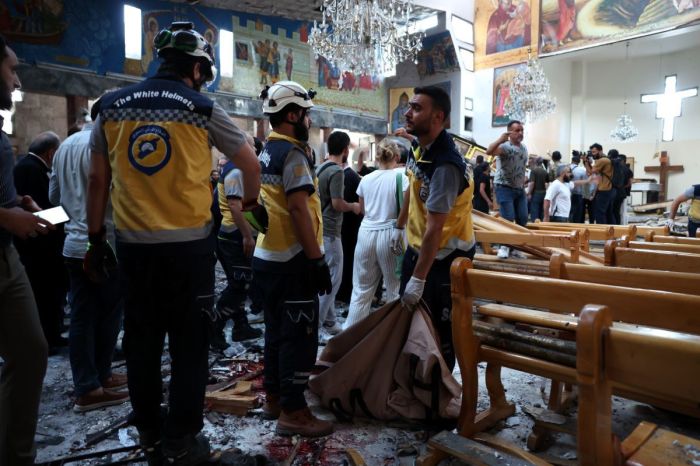
Following a preliminary investigation, the Syrian government says the Islamic State is responsible for a suicide bombing at a Greek Orthodox church in Damascus that killed at least 25 people and injured dozens of others on Sunday.
The blast occurred Sunday morning during a prayer service at the Mar Elias Church in the Al-Douweila district of the Syrian capital, UPI reported, saying the assailant entered the building, opened fire on the congregation and then detonated an explosive vest.
Security forces sealed off the area, allowing bomb disposal and forensic teams to begin investigating the scene. Graphic images shared by the Greek Orthodox Patriarchate of Antioch showed bloodied floors and scattered remains inside the church.
The initial casualty toll released by Syria’s Ministry of Health reported nine dead and 13 injured. By Monday morning, the figures had risen to at least 25 dead and 59 wounded, with the health ministry sharing photos of Assistant Health Minister Hussein Al-Khatib visiting survivors at local hospitals.
Interior Minister Anas Khattab condemned the attack on social media and vowed that “terrorist acts will not deter the Syrian state’s efforts to achieve civil peace.”
“A suicide bomber affiliated with the terrorist organization ISIS entered St. Elias Church in the Douweila neighborhood of Damascus, opened fire, and then detonated an explosive vest,” a statement from Khattab reads.
The Greek Orthodox Patriarchate of Antioch released a statement following the bombing, saying, “The arrow of lawlessness was unleashed and struck our souls in the night.” It called for prayers for the dead and support for the wounded.
While no group immediately claimed responsibility, Interior Ministry spokesman Noureddine Al-Baba said the Islamic State was suspected based on preliminary findings.
“The security of places of worship is a red line,” Al-Baba said, adding that such attacks were attempts to destabilize Syria and undermine national coexistence, according to Fox News.
The country’s foreign ministry called the attack “a desperate attempt” to create discord during Syria’s fragile transitional period.
In addition to the bombing of Mar Elias Church, a suicide bomber also targeted Deir Ibrahim al-Khalil Monastery in Douweila, Damascus, on Sunday, while other terrorists targeted the Church of Our Lady in Maqsura, according to All Arab News.
The attacks took place amid regional instability, including recent U.S. airstrikes on Iranian nuclear sites and retaliatory attacks in Tehran.
IS (also known as ISIS or ISIL) later claimed responsibility for the bombing in a statement reported by The Telegraph.
The terror group has long targeted Christians and other religious minorities in Syria and Iraq, adhering to a rigid sectarian ideology that views non-Sunni groups as legitimate targets.
The attack marks one of the deadliest assaults against Christians in Syria since the fall of the Assad regime last December. The new transitional government, led by Interim President Ahmed al-Sharaa, had warned of renewed threats from IS and dismantled Assad-era intelligence agencies in a bid to improve national security.
Al-Sharaa’s administration has reportedly coordinated closely with U.S. forces to pursue IS cells, particularly in the eastern and central desert regions. Syrian and American forces jointly conducted raids recently, targeting suspected IS operatives in Aleppo and Deir al-Zor.
United Nations Special Envoy for Syria Geir O. Pedersen condemned the bombing as a “heinous crime,” while U.S. Ambassador to Syria Tom Barrack wrote on X that “these terrible acts of cowardice have no place in the new tapestry of integrated tolerance and inclusion that Syrians are weaving.”
U.S. military intelligence has tracked renewed IS activity across Syria and Iraq, particularly in urban centers such as Hasakah, Kirkuk and Deir al-Zor. These areas, with porous borders and limited state control, have become hubs for arms movement, recruitment and sleeper cell activation.
Since the territorial defeat of IS in 2017, the group has transitioned from open warfare to a low-intensity insurgency, relying on sporadic attacks and local sympathizers.
U.S. Central Command reported in March that airstrikes killed several mid-level IS planners, though an estimated 2,500 fighters remain active across Iraq and Syria.
The bombing in Damascus followed a series of targeted killings and attempted jailbreaks involving suspected IS members.
Last month, Syria’s new authorities reported killing three militants and arresting four others during raids in Aleppo. In December, Iraqi forces foiled a plot after intercepting IS couriers from Syria.
The SITE Intelligence Group reported a decline in IS-claimed attacks in Syria during the first five months of 2025 compared to 2024, but analysts believe this reflects a change in tactics rather than a loss of capability.
The interim Syrian government has described IS as its most persistent internal threat. Intelligence officials believe the group aims to exploit post-Assad political uncertainty and weaken the transitional administration by targeting symbols of religious diversity and national reconciliation.

















